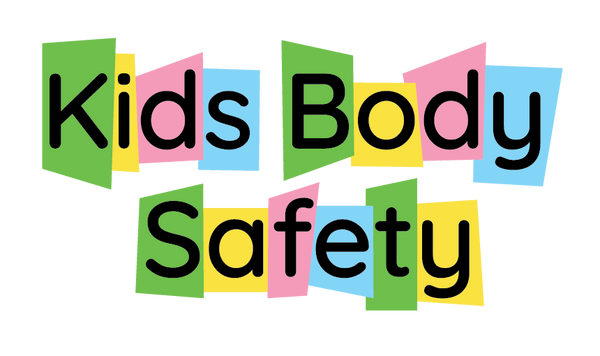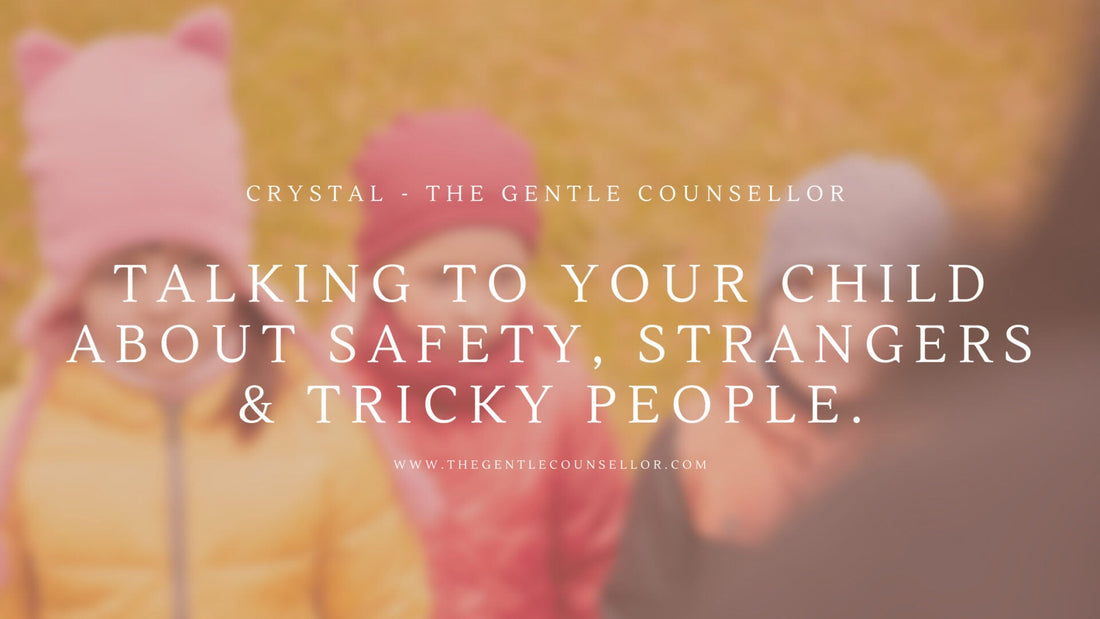by Crystal - The Gentle Counsellor
If you are worried about how to protect your child, here are some helpful tips and information on how to keep your child safe.
I will start this with a personal story that I can share as an example of being approached by strangers and how I dealt with the situation. For reference, at the time of this happening my children are 5 and 3 years old.
I took my son (3) to the doctors and had two strangers overly talking to us during our time there… one was a lady in the lineup who appeared to just enjoy engaging in conversation with my daughter (5) and seemed friendly. The other was when we were sitting in the waiting room and a young adult man came to us and started engaging with only my son (who hates strangers and was not responding). This one made me feel uncomfortable. It did seem like there was maybe something more going on with him as the way he spoke and engaged seemed a bit developmentally delayed and immature for his age.
I want to talk about this second stranger encounter more. This man had made a point of coming across the building to us (actually, he ran over) as whoever he was with was trying to call him over but he kept saying to them, “No, I am sitting here, you go in.” He was saying a few things seemingly attempting to engage in conversation but then made a comment about liking Batman too. For context, I was wearing a shirt with the Batman logo on it, but when I looked up he was not talking to me and then said, “Oh, Mummy likes Batman, do you? I like Batman.” He seemed very awkward and not wanting to engage with me, just focusing on my son. We weren’t responding and then he was already up again and walked off to whoever he was with on the other side. Throughout this time there was more conversation said and he was physically too close for comfort too.
I couldn’t quite think of anything to say in the moment. We were in a safe environment, no one was being rude or aggressive, yes I did feel uncomfortable but also didn’t want to freak out the kids. So I decided I would talk to them about it after we left.
Tip 1: If you are unable to discuss things in the moment, remember you can always approach it after the event. Try not to leave it more than 24 hours.
When we got in the car I asked the kids what they thought about the two strangers who were talking to us. Mainly my daughter was the one who was really listening and responding to this conversation.
She said they seemed friendly. I clarified that they were strangers and we didn’t know them, which she agreed with. I asked about each one individually. She said that the lady seemed nice just talking to her and the man seemed interested in what they were drawing and doing. I then asked if she felt uncomfortable about each. She said no to the lady and yes to the man.
I talked about how there are tricky people, but we don’t know who. Tricky people can be a stranger or someone we know, but they want to hurt us, make us feel unsafe, or tell us to keep secrets. I asked her if we keep secrets, and she replied that no we do not keep secrets.
Tip 2: Talk about fun things as a surprise, not a secret. Language is important. Make it a rule to not keep secrets.
I then talked about how we have to listen to our brain, our heart, and our stomach because that is how our body tells us and we know if someone is a tricky person.
We talk about tricky people, not stranger danger. Because in my line of work I am well aware of the statistics especially ones where perpetrators are often someone known to the person.
Tip 3: Teach your child to be aware of Tricky People. The old school concept of stranger danger is inaccurate and not helpful to protecting your child. A stranger can be a policeman, but they can be helpful. A Tricky Person can be a stranger or more often it is someone known to the child.
My daughter said that her stomach was telling her that he was a tricky person. I said to her, “You know what, my stomach was telling me that too.” I wanted her to know that I felt it too. The red flag for me was more so the fixation on my son during all interactions. This is the first time I have honestly had this feeling about a stranger because usually, they are just being friendly to all of us. I definitely do not know for certain, but I am a big believer in listening to your instincts and I definitely want to teach my kids that too.
Tip 4: Teaching your child to listen to their instincts, which we can tell by our brain, heart, and stomach if something doesn’t seem quite right.
We then talked about how she would have felt if I wasn’t there. I could sense a shift in her and she really thought about it. She said she would not have talked to the strangers.
I acknowledged that she felt safe because I was there, and that’s good that she feels safe with me. I asked her what she could do if I wasn’t there. She said she would go and let the lady or man that worked there.
Tip 5: Talk to your child about who is a safe adult they can go to for help. Make a list if you can. Practice different scenarios too and give examples.
When I tell you that I was CHEERING on the inside at all of her answers!
I have always read age-appropriate books with her about keeping herself safe. I’ll share below my current recommendations. But having these types of conversations is important it’s not about scaring them, it’s about making sure they are aware and prepared. Engaging in that reflection like I did after was great to be able to use a real-life example that we experienced and apply those teachings AND for me to get confirmation that I’ve done something ‘right.’ here.
Tip 6: Talk about it. When you have moments encountering uncomfortable situations, make sure to revisit these strategies and reread books together.
This is my go-to book that I have always read to my kids. It talks about what our body parts are for and uses accurate terminology for private parts. It also talks about saying no and if in trouble to talk to a trusted adult. I 100% believe everyone should own this book.
Everyone’s got a bottom by Tess Rowley (here is a link to the book on YouTube, you can search on google to purchase)This is a great book that a lot of us professionals have had in our resources for years. It addresses not liking to kiss certain family members, or for kiddos who like being in their birthday suit, it explains why we need to be clothed. It also talks a little more about different private parts and rules that keep us safe. It is a really well done, educational, informative, relevant, and engaging book. 10/10.
Some Secrets Should Never Be Kept by Jayneen Sanders (here is a link to the book on YouTube, you can search on google to purchase)
This one I would say in the more serious one because it actually tells a story of sexual abuse. It is still a great book, and still child age-appropriate. I would probably recommend this more if you’re a professional working with kids to help you understand a bit more, and if working with children (or perhaps your child) who have been or you are suspicious of experiencing sexual abuse to help them tell their story. It addresses grooming behaviour and encouraging the child to speak up.
I hope this has helped and if your child needs someone to talk to you can utilise Kids Helpline 1800 55 1800
Let’s talk about how to listen to our child if they disclose to us that they have been harmed. I know this is uncomfortable, but unfortunately, we HAVE to talk about it.
Did you know that statistically, the abuser is someone known to the child? This is why ‘stranger danger’ is problematic, instead I suggest talking about ‘tricky people’.
The most important thing is that we listen and we believe.
– It is not our role to ask questions, investigate or interview.
– It IS your role to be with your child and tell them that you love them no matter what.
– We do not want to place blame, judgment, or shame on the child who is the victim.
– We DO want to get them professional help to support them through their healing.
Please contact your local child protection authorities and school counsellor, child psychologist, or play therapist for support.

